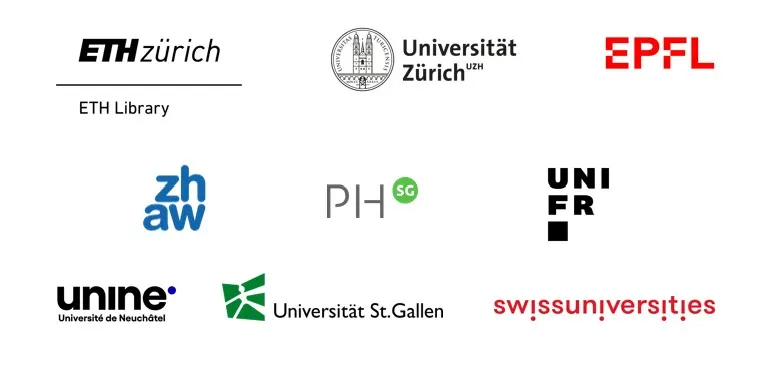About
What NAIF is, why it matters, and who is involved
- Duration: July 2025 to December 2026
- Funding: Eight Swiss Higher Education Institutions and swissuniversities
- Focus: Interoperability and standardisation across Swiss institutional repositories
- Contact: naif@library.ethz.ch
Project in brief
Swiss Higher Education Institutions operate institutional repositories with varying practices and metadata quality. This fragmentation makes national-level discovery, monitoring, and analysis difficult.
NAIF addresses this by combining conceptual design (national scenarios and governance choices) with technical implementation work (metadata harmonisation and interoperability requirements).
Partners
The project partners are:
- ETH Library (ETH Zurich)
- University of Zurich
- EPFL
- ZHAW Zurich University of Applied Sciences
- PHSG St.Gallen University of Teacher Education
- University of Fribourg
- University of Neuchatel
- University of St.Gallen

Objectives
- Make research outputs by researchers at Swiss HEIs more visible.
- Improve the data basis for monitoring and steering Swiss research, with a focus on Open Access.
- Promote the responsible use of indicators in research assessment, aligned with DORA and CoARA.
Approach
- Work towards shared standards and interoperability across repositories.
- Develop scenarios for a national approach to disseminate and reuse Swiss research results.
- Identify the factors that ensure dissemination (integration into global ecosystems) and findability (high-quality metadata).
Timeline
| Period | Milestone |
|---|---|
| July 2025 | Project start |
| 2025-2026 | Track activities: workshops, inventories, consultations, recommendations |
| December 2026 | Project end |
Tracks
NAIF is organised into four coordinated tracks plus one cross-track outcome.
Track 1: Responsible use of quantitative indicators
Responsible partners: ZHAW Zurich University of Applied Sciences, ETH Zurich, University of Zurich (CHESS)
This track promotes responsible use of indicators for research assessment and links indicator practice with repository interoperability.
- Align guidance with DORA and CoARA.
- Connect indicator use to metadata standardisation priorities.
- Engage the Swiss Year of Scientometrics (SYoS) community and CHESS.
Track 2: National scenarios for Switzerland
Responsible partners: University of Zurich, ETH Zurich
This track reviews international national approaches and develops options for Switzerland.
- Run structured workshops with international experts.
- Compare governance models, funding, sustainability, and technical setups (federated vs centralised).
- Gather Swiss stakeholder requirements through consultations (for example roundtables and white papers).
- Consider secondary publication rights.
Track 3: Survey of Swiss repositories
Responsible partners: EPFL
This track analyses Swiss institutional repositories, starting from the list of accredited institutions by swissuniversities, and extends context from the Swiss Open Access Monitor.
- Assess standards, certifications, and repository software (for example OpenAIRE guidelines and CoreTrustSeal).
- Evaluate metadata availability, quality, and completeness against international practices (OpenAIRE, Dublin Core, DataCite).
- Identify technical barriers to seamless data exchange and integration.
- Produce a gap-analysis report with recommendations for harmonisation and alignment.
Track 4: Enhancement of national and global academic data
Responsible partners: ETH Zurich, University of Fribourg
This track focuses on enrichment data used in repositories, including identifiers and contextual metadata.
- Address organisation identifiers (for example ROR), researcher identifiers (for example ORCID), funding data, and Open Access metadata.
- Use workshops and virtual sessions to prioritise relevant data improvements.
- Convert priorities into practical deliverables, such as mappings, authoritative lists, and implementation guidance.
Unified outcome: National working group
Responsible partners: ETH Zurich, EPFL, ZHAW Zurich University of Applied Sciences, University of Zurich
Findings across all tracks feed into a shared national working group model.
- Define status, organisational form, and representativeness criteria.
- Set shared strategy, goals, and actions for dissemination and findability of Swiss research outputs.
- Sustain interoperability progress beyond the project period.
Open peer review
The abstract and review of the NAIF project proposal are available on the swissuniversities website.
Publishing guidelines
Public guidance for project partners and contributors on how to write news posts or event entries for this site: Publishing guidelines
Contact
If you have any questions, feedback or ideas, or if you would like to connect with us, feel free to reach out:
- Email: naif@library.ethz.ch
Team
Project leaders
- Dr David Johann (ETH Library, ETH Zurich)
Project coordinator
- Dr Moritz Mähr (ETH Library, ETH Zurich)
Work packages leaders
- Pascale Bouton (EPFL)
- Dr David Johann (ETH Library, ETH Zurich)
- Dr Martin Jaekel (ZHAW Zurich University of Applied Sciences)
- Dr Andrea Malits (University of Zurich)
- Dr Rüdiger Mutz (CHESS, University of Zurich)
- Julien Sicot (EPFL)
- Stefan Vogt (University of Zurich)
Project contributors
[list of contributors in preparation]
Other projects and initiatives
COAR International Repositories Directory (IRD)
COAR International Repositories Directory (IRD). The IRD provides information about the current repository landscape.
Swiss Open Access Monitor
Swiss Open Access Monitor. The Swiss Open Access Monitor is a tool to monitor the progress of the implementation of Open Access at the national level in Switzerland. It contains a Journal Monitor based on OpenAlex and other data sources, as well as a Repository Monitor based on the publication lists delivered by participating institutions.
Swiss Open Academic Data (SOAD)
Swiss Open Academic Data (SOAD). The Swiss Open Academic Data (SOAD) community gathers researchers and practitioners around open academic data in Switzerland.
Swiss Year of Scientometrics (SYoS)
Swiss Year of Scientometrics (SYoS). Swiss Year of Scientometrics (SYoS) is a series of Lectures and Workshops organized by the ETH Library to promote responsible research assessment in Switzerland.